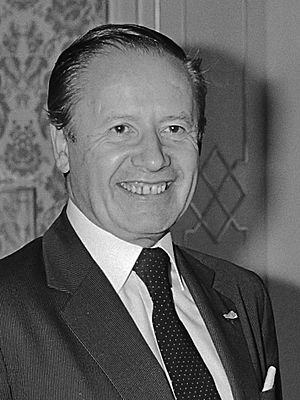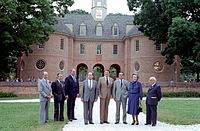Gaston Thorn facts for kids
Quick facts for kids
Gaston Thorn
|
|
|---|---|

Thorn in 1984
|
|
| President of the European Commission | |
| In office 20 January 1981 – 6 January 1985 |
|
| Preceded by | Roy Jenkins |
| Succeeded by | Jacques Delors |
| 19th Prime Minister of Luxembourg | |
| In office 15 June 1974 – 16 July 1979 |
|
| Monarch | Jean |
| Deputy | Raymond Vouel Bernard Berg |
| Preceded by | Pierre Werner |
| Succeeded by | Pierre Werner |
| President of the United Nations General Assembly | |
| In office 1975–1976 |
|
| Preceded by | Abdelaziz Bouteflika |
| Succeeded by | Hamilton Shirley Amerasinghe |
| Personal details | |
| Born |
Gaston Egmond Thorn
3 September 1928 Luxembourg, Luxembourg |
| Died | August 26, 2007 (aged 78) Luxembourg, Luxembourg |
| Political party | Democratic |
| Spouse | Liliane Thorn-Petit |
| Children | 1 |
Gaston Egmond Thorn (born September 3, 1928 – died August 26, 2007) was an important politician from Luxembourg. He held many top jobs both in his home country and around the world. He was the 19th Prime Minister of Luxembourg from 1974 to 1979. He also served as the President of the United Nations General Assembly in 1975. Later, he became the seventh President of the European Commission from 1981 to 1985.
Contents
Early Life and Political Beginnings
Gaston Thorn was born in Luxembourg City. He spent his early years in Strasbourg, France, where his father worked for the railway. When World War II started, his family moved back to Luxembourg.
While still a student, he joined the resistance against the German occupation. Because of this, he was put in prison for several months. After the war, he first studied medicine. Then he changed to law, studying in Lausanne and Paris. He started working as a lawyer in Luxembourg in 1955.
In 1957, he married Liliane Petit, who was a journalist. Thorn entered politics in 1959. He joined the liberal Democratic Party. He was a member of the European Parliament from 1959 to 1969. He also led the Democratic Party from 1962 to 1969. From 1961 to 1963, he was an alderman for Luxembourg City.
Key Roles in Government
Thorn held several important government positions in Luxembourg. He was the Foreign Minister and Foreign Trade Minister from 1969 to 1980. He also served as Prime Minister from 1974 to 1979. From 1977 to 1980, he was the Minister of Economics.
From 1975 to 1976, he was chosen to be the President of the United Nations General Assembly. This was for its 30th meeting.
As Prime Minister, Gaston Thorn led a government that was a mix of his Democratic Party and the Luxembourg Socialist Workers' Party. This was a big deal because it was the first time since World War II that Luxembourg's government did not include the powerful Christian Social People's Party. Thorn was also the first Prime Minister from a party other than the Christian Social People's Party since the war. Even though his party had fewer seats, he was chosen to lead the government.
Leading the European Commission
In 1980, Gaston Thorn was selected to be the President of the Commission of the European Communities. Today, this is known as the European Union. He took office on January 12, 1981. Some countries, like France and Britain, were not keen on him getting the job. However, smaller countries and West Germany supported him. They valued Luxembourg's role in helping to build the European Commission.
His time as president was challenging. The European Community faced economic and political problems. There were also disagreements between the Commission and the British government. Britain's Prime Minister, Margaret Thatcher, wanted her country to pay less into the European budget.
Other issues caused tension too. Some European leaders disagreed with Britain's role in the Falklands War. There was also opposition to the United States' foreign policy. The deployment of certain missiles in Europe also caused concern. All these issues, along with a long-running global economic slowdown, made it hard for Thorn to push for more European unity.
Despite these challenges, Thorn did achieve some important things. He helped reach an agreement on a common fisheries policy. He also prepared the way for Portugal and Spain to join the European Community. Greece had just joined when he started his term in 1981.
Even though Thorn was not seen as a very forceful leader, the European Commission grew stronger during his time. It gained more power compared to national governments and the European Parliament. Thorn helped set the stage for his successor, Jacques Delors, who would make the Commission even more powerful.
Life After Politics
After leaving the European Commission in 1985, Thorn moved into the business world. He became the chairman of Luxembourg's biggest media company, CLT. He also served as the president of the Banque Internationale à Luxembourg from 1985 to 1999.
Thorn continued to be involved in international and political matters. He was the President of the International European Movement. He was also a member of important groups like the Trilateral Commission and the Bilderberg conference. He also led the Liberal International. He was married to Liliane Thorn-Petit, a journalist, and they had one son.
Honours and Recognition
Gaston Thorn received many awards for his service. These included:
- Grand Cross of the Order of Adolphe of Nassau
- Grand Cross of the Pian Order
- Grand Cross of the Legion of Honour
- Honorary Knight Grand Cross of the Royal Victorian Order
- Honorary Knight Grand Cross of the Order of St Michael and St George
See also
 In Spanish: Gaston Thorn para niños
In Spanish: Gaston Thorn para niños
- List of prime ministers of Luxembourg
- Thorn Ministry
- Werner-Thorn Ministry
 | Emma Amos |
 | Edward Mitchell Bannister |
 | Larry D. Alexander |
 | Ernie Barnes |


